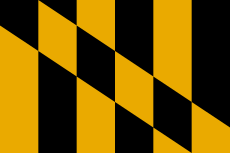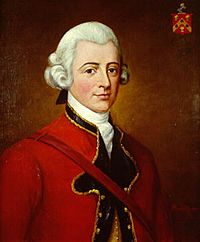Annapolis Convention (1774–1776) facts for kids
Quick facts for kids Annapolis ConventionAssembly of Freeman |
|
|---|---|

|
|
| Type | |
| Type |
Unicameral provisional, Revolutionary legislature and government of Province of Maryland
|
| History | |
| Founded | June 22, 1774 |
| Disbanded | January 28, 1776 |
| Preceded by | Maryland General Assembly (dissolved) |
| Succeeded by | Maryland General Assembly (New constitution) |
| Leadership | |
|
Chair
|
|
| Meeting place | |
| Annapolis | |
| Constitution | |
| Declaration of the Association of the Freemen of Maryland | |
The Annapolis Convention was an important meeting of representatives from the counties of Maryland. It acted as Maryland's government from 1774 to 1776. This was during the exciting time leading up to the American Revolution. After 1775, it was officially known as the Assembly of Freemen.
Contents
Why the Convention Met

In 1774, people in the American colonies were very upset with Great Britain. Many groups, called committees of correspondence, were formed to share news and ideas. They wanted to support Boston, Massachusetts, because its port was closed and more British soldiers were sent there.
Massachusetts suggested a big meeting, a Continental Congress, for all colonies to decide what to do together. To stop this, Maryland's royal governor, Robert Eden, officially ended the Maryland General Assembly on April 19, 1774. This was the last time the colonial assembly met in Maryland.
However, the assembly members decided to meet again in June in Annapolis. They wanted to find out what the people in their counties thought. Over the next two and a half years, the Convention met nine times. It acted as the main government for Maryland during this period.
Meetings of the Convention
1774 Meetings
The first meeting of the Convention lasted four days, from June 22 to June 25, 1774. All sixteen counties in Maryland sent representatives, with a total of 92 members. They chose Matthew Tilghman to lead their meetings.
In this short time, they decided several key things:
- Each county would have one vote.
- They passed resolutions to support Boston and sent supplies to them.
- The Convention would meet whenever needed.
- A special Committee of Correspondence would work between meetings.
- They agreed to support rules against importing British goods if the Continental Congress asked for it.
- They chose people to represent Maryland at the first Continental Congress.
Other meetings were held later in 1774, from November 21–25 and December 8–12.
1775 Meetings
The Convention met again from July 26 to August 14, 1775, and then from December 7, 1775, to January 28, 1776.
Declaration of the Freemen of Maryland
During the July 1775 meeting, the Convention created an important document called the Declaration of the Association of the Freemen of Maryland. This declaration explained why the people of Maryland felt it was necessary to stand up against British rule.
It stated that the British government wanted to tax the colonists without their permission. It also mentioned how Britain was punishing Massachusetts and trying to change the colonies' laws. The declaration said that these actions forced the colonists to defend their freedom.
The Convention decided that the colonies needed to prepare for defense. They agreed to support the fight against British troops. They also pledged to work together to stop trade with Britain.
The declaration also stressed the importance of keeping order and peace during these difficult times. It said that people should support the existing laws and protect others from harm. Any punishments should only be given by legal authorities like the civil magistrate, the Continental Congress, or the Convention itself.
1776 Meetings
The Convention held its final meetings in 1776: May 8–25, June 21–July 6, and August 14–November 11.
The eighth meeting decided that having an ad hoc (meaning "for a specific purpose only") government like the Convention was not the best way to run the province. They needed a more lasting and organized government.
So, on July 3, 1776, they decided that a new convention should be elected. This new group would be in charge of writing Maryland's first state constitution. This new constitution would not mention the British Parliament or the King. Instead, it would create a government "of the people only."
After setting dates and preparing notices for the counties, the Convention ended its session. On August 1, all free men who owned property voted for delegates to the last convention.
The ninth and final convention was also known as the Constitutional Convention of 1776. This group wrote the new constitution for Maryland. When they finished on November 11, they did not meet again. The Annapolis Conventions were then replaced by Maryland's new state government.
 | John T. Biggers |
 | Thomas Blackshear |
 | Mark Bradford |
 | Beverly Buchanan |

